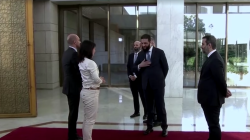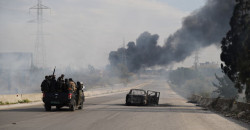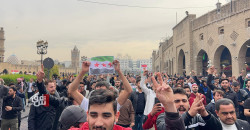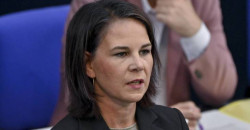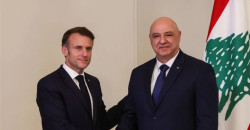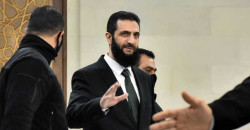German FM visits Damascus: No funding for new Islamic structures
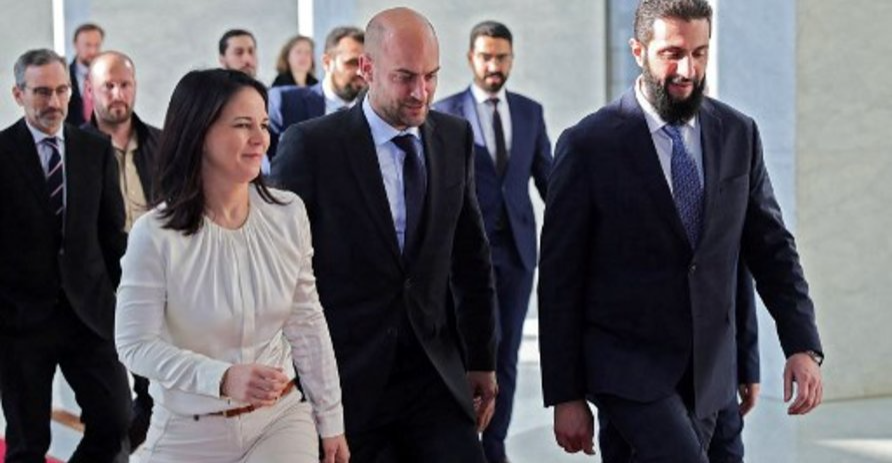
Shafaq News/ German Foreign Minister Annalena Baerbock stated that Europe will support Syria, but it will not fund the establishment of "new Islamic structures in the country," after she met with Ahmed Al-Sharaa, the de facto leader of Syria, on Friday.
Baerbock added that lifting sanctions on Syria "entirely depends on the progress of the political process," noting that "the transition in Syria has not yet been achieved."
Baerbock and her French counterpart, Jean-Noel Barrot, are the first European Union ministers to visit Syria since the opposition took control of Damascus on December 8, forcing former President Bashar al-Assad to flee after more than 13 years of civil war, ending his family's decades-long rule.
The visit aimed to send a message of cautious optimism to the Islamic opposition led by Hayat Tahrir al-Sham (HTS) and to show openness to recognizing Syria's new rulers while urging them to moderate and respect minority rights.
The German and French foreign ministers expressed their desire to establish new relations with Syria and urged a peaceful transition of power during their visit to Damascus on Friday on behalf of the European Union.
EU High Representative for Foreign Affairs and Security Policy Kaja Kallas shared on X regarding the visit, "Our message to Syria’s new leadership: respecting the principles agreed with regional actors and ensuring the protection of all civilians and minorities is of the utmost importance."
Barrot and Baerbock met with Al-Sharaa at the People's Palace in Damascus, but the details of the discussions have not yet been disclosed.
Since Al-Assad's ouster, the Islamic opposition groups have sought to reassure Arab countries and the international community that they will govern on behalf of all Syrians and will not export an Islamic revolution.
Western governments have gradually opened channels of communication with Al-Sharaa and HTS, which was previously an offshoot of the extremist al-Qaeda organization. Governments have also begun discussing whether to remove the group from terrorist lists.
However, many questions remain about the future of a multi-component country where foreign powers, including Turkiye and Russia, have strong and potentially competing interests.
Baerbock stated that she is approaching Syria with an "outstretched hand" and "clear expectations" from the new administration, adding that the judgment of this administration will be based on its actions.
In a statement before heading to Syria, Baerbock said, "We know the ideological affiliation of HTS and what it has done in the past," adding that a new beginning in relations can only happen if there is no room for extremism.
"But we also hear and see the desire for moderation and understanding with other important parties," she continued, referring to talks with the US-allied Kurdish Syrian Democratic Forces (SDF).
Baerbock mentioned that the goal now is for Syria to once again become a respected member of the international community, which also serves Europe's security interests.
For his part, Barrot expressed hope that Syria would become a "sovereign state where security prevails," with no place for terrorism, chemical weapons, or malicious foreign actors, during a meeting with representatives of Syrian civil society organizations.
Barrot told reporters that Germany and France intend to provide technical assistance and advice to Syria in drafting a new constitution for the country, adding that the hope for a democratic transition in the country is "fragile but real."
He called for a political solution that includes integrating Kurdish fighters into the Syrian state, saying that "a permanent ceasefire must be reached." However, he did not respond when asked about the potential timing for lifting EU sanctions on Syria.
French diplomatic sources mentioned that Barrot visited the closed French embassy in Damascus, signaling a potential restoration of diplomatic ties under improved political and security conditions. However, he refrained from commenting on the timeline for lifting EU sanctions on Syria.
During their visit, the ministers toured Sednaya Prison, infamous for its human rights abuses, and vowed international support for achieving justice for victims.
